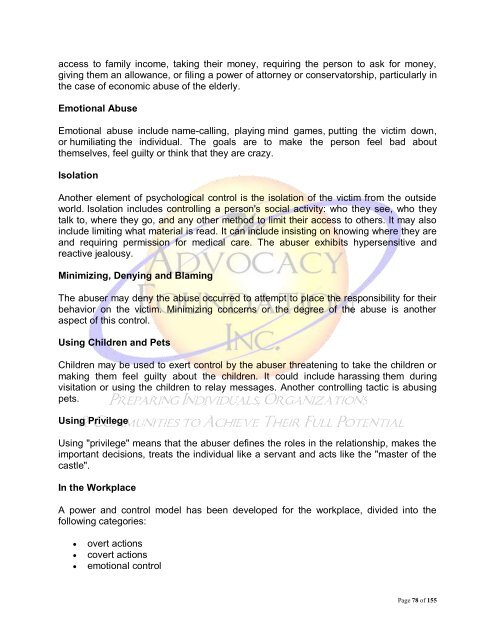Organizational Dysfunction
Organizational Dysfunction
Organizational Dysfunction
Create successful ePaper yourself
Turn your PDF publications into a flip-book with our unique Google optimized e-Paper software.
access to family income, taking their money, requiring the person to ask for money,<br />
giving them an allowance, or filing a power of attorney or conservatorship, particularly in<br />
the case of economic abuse of the elderly.<br />
Emotional Abuse<br />
Emotional abuse include name-calling, playing mind games, putting the victim down,<br />
or humiliating the individual. The goals are to make the person feel bad about<br />
themselves, feel guilty or think that they are crazy.<br />
Isolation<br />
Another element of psychological control is the isolation of the victim from the outside<br />
world. Isolation includes controlling a person's social activity: who they see, who they<br />
talk to, where they go, and any other method to limit their access to others. It may also<br />
include limiting what material is read. It can include insisting on knowing where they are<br />
and requiring permission for medical care. The abuser exhibits hypersensitive and<br />
reactive jealousy.<br />
Minimizing, Denying and Blaming<br />
The abuser may deny the abuse occurred to attempt to place the responsibility for their<br />
behavior on the victim. Minimizing concerns or the degree of the abuse is another<br />
aspect of this control.<br />
Using Children and Pets<br />
Children may be used to exert control by the abuser threatening to take the children or<br />
making them feel guilty about the children. It could include harassing them during<br />
visitation or using the children to relay messages. Another controlling tactic is abusing<br />
pets.<br />
Using Privilege<br />
Using "privilege" means that the abuser defines the roles in the relationship, makes the<br />
important decisions, treats the individual like a servant and acts like the "master of the<br />
castle".<br />
In the Workplace<br />
A power and control model has been developed for the workplace, divided into the<br />
following categories:<br />
<br />
<br />
<br />
overt actions<br />
covert actions<br />
emotional control<br />
Page 78 of 155

















